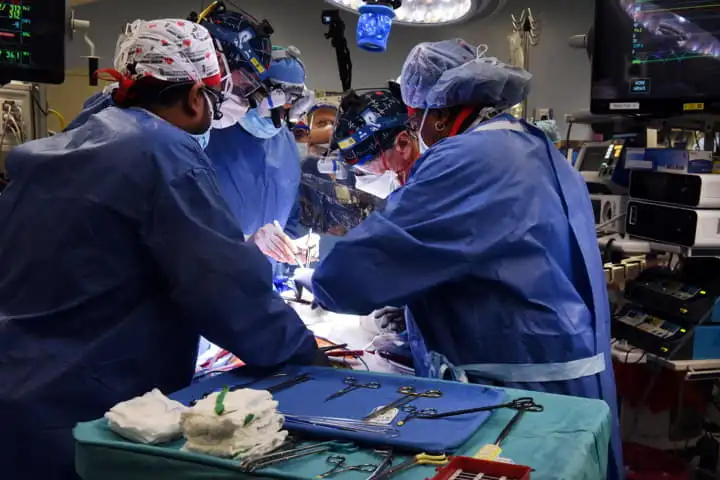US surgeons have successfully implanted a heart from a genetically modified pig in a 57-year-old man, a historic medical breakthrough that could provide a solution to the chronic shortage of organ donations.
The historic procedure took place Friday, the University of Maryland Medical School said in a statement on Monday. While the patient's prognosis is far from certain, it represents a major milestone for animal to human transplantation.
The patient, David Bennett, had been deemed ineligible for human transplant because of his very poor underlying health.
He is now recovering and being carefully monitored to determine how the new organ performs.
"This was a breakthrough surgery and brings us one step closer to solving the organ shortage crisis," said Bartley Griffith, who surgically transplanted the pig heart.
"We are proceeding cautiously, but we are also optimistic that this first-in-the-world surgery will provide an important new option for patients in the future."
Bennett, who has spent the last several months bedridden on a heart-lung bypass machine, added: "I look forward to getting out of bed after I recover."
The Food and Drug Administration granted emergency authorization for the surgery on New Year's Eve, as a last ditch effort for a patient who was unsuitable for conventional transplant.
Muhammad Mohiuddin, who co-founded the university's cardiac xenotransplantation program, said the surgery was the culmination of years or research, involving pig-to-baboon transplants, with survival times that exceeded nine months.
Read also: Is Imran Khan’s theocratic model driving Pakistan to the abyss?
"The successful procedure provided valuable information to help the medical community improve this potentially life-saving method in future patients," he said.
The donor pig belonged to a herd that had undergone genetic editing procedures.
Three genes that would have led to rejection of pig organs by humans were "knocked out," as was a gene that would have led to excessive growth of pig heart tissue.
Six human genes responsible for human acceptance were inserted into the genome, for a total of 10 unique gene edits.
The editing was performed by Virginia-based biotech firm Revivicor, which also supplied the pig used in a breakthrough kidney transplant on brain dead patients in New York in October.
But while that surgery was purely a proof-of-concept experiment, and the kidney was connected outside the patient's body, the new surgery is intended to save a person's life.
At present pig heart valves are widely used in humans, and pig skin is grafted on human burn victims.




















